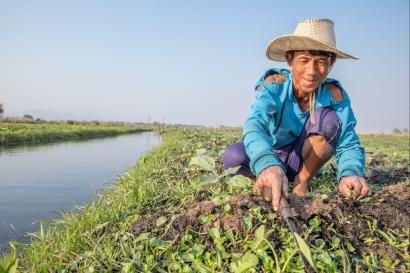Strategic Resilience Assessment (STRESS)

What is STRESS?
STRESS is a methodology that helps teams apply resilience thinking in distinct humanitarian or development contexts. Deepening understanding of risk and the systems communities rely on allows practitioners to adjust what they do and how they do it—helping maintain progress toward well-being outcomes even in the face of increasing instability and fragility.
Read the two-page background document on STRESS
Read Mercy Corps’ STRESS Process Guidelines
Why STRESS?
In an era of rapid change and increasing complexity, we must invest strategically to achieve long-term change--Mercy Corps believes resilience is critical to this work. In helping us apply resilience thinking, STRESS is transforming the scale, effectiveness and impact of our humanitarian and development strategies, getting to the roots of the interconnected challenges driving fragility and reshaping the way our teams learn and work together.
STRESS is transforming what we do by providing new ways of:
- Analyzing each unique context to understand how complex, interconnected drivers of instability threaten progress; how these drivers impact groups differently; and what specific resilience abilities and resources these groups need to learn, cope, adapt and transform in the face of growing risk.
- Designing a contextualized resilience theory of change based on this analysis, which allows teams to create more robust strategies and targeted interventions aimed at supporting communities in achieving long-term well-being outcomes and transformational change.
STRESS is transforming how we do it by improving the way teams work together, helping us become more:
- Proactive by developing an evidence-based understanding of each context.
- Connected by restructuring roles and processes to address the interconnections between instability and vulnerability.
- Adaptive by leveraging the resilience framework to test, measure and enhance work over time.
Resources
Karamoja: Regional-Level Assessment
Undertaken between February and April 2016, this STRESS seeks to understand vulnerability and resilience in the context of Karamoja, identifying a set of capacities vital to securing Mercy Corp’s vision and theory of change for building an Empowered Karamoja by 2026.
Read the brief | Full report | Video: Empowering Karamoja
Niger: Country-Level Assessment
Mercy Corps and our local partners conducted a country-level STRESS to deepen our understanding of the complex systems that support food security in the Sahel’s fastest growing country. The result was a theory of change depicting what combination of resilience capacities are most needed in Niger for agro-pastoralist women, men, girls and boys to successfully manage risk now and in the future.
Read the brief | Full report: EN, FR | Video: Transforming the Way We Learn and Work Together | Video: Theodore Kabore Reflects on STRESS in Niger
Nepal: PAHAL Program-Level Assessment
The Promoting Agriculture, Health and Alternative Livelihoods (PAHAL) program is a $37 million, five-year USAID initiative designed to achieve food security among vulnerable populations in the hill and mountain regions of Midwestern and Far West Nepal. To develop a resilience-specific program theory of change, the PAHAL team conducted a STRESS in collaboration with a wide range of actors, analyzing the dynamic social, ecological and economic systems within which communities are embedded and how these conditions determine vulnerability to shocks and stresses and, ultimately, their level of food security.
Mongolia: Country-Level Assessment
In 2016, as part of the start-up of its Resilient Communities Program, and in collaboration with partners, donors and citizen groups, Mercy Corps conducted a STRESS focusing on Mongolia’s herding communities and rapidly urbanizing areas. The process helped to examine connections among social, ecological and economic systems, and how these impacted households’ and communities’ well-being in the face of shocks and stresses as well as identified what combination of resilience capacities are most needed in Mongolia to successfully manage risks into the future.
Myanmar: Dry-Zone Regional-Level Assessment
To better understand the connections between poverty, vulnerability and the resilience capacity of the Dry Zone farming communities, Mercy Corps conducted a Strategic Resilience Assessment (STRESS). This was Mercy Corps’ very first STRESS assessment.
Bangladesh: Planting Seeds of Resilience in Humanitarian Settings
In 2018, Mercy Corps and IOM Bangladesh piloted a rapid humanitarian Strategic Resilience Assessment (STRESS) in the largest refugee camp in the world, Cox’s Bazar, Bangladesh. Utilizing a participatory disaster risk reduction and resilience approach in this complex humanitarian context, where Rohingya refugees are exposed to natural and built hazards, violence, coercion, and deprivation, this assessment enabled systems thinking and a pro-refugee approach to transform how we understand and address risk through humanitarian operations, through more holistic, empowering resilience-building pathways.